人教版高一英语必修一Unit4 Natural disasters
- 格式:pptx
- 大小:77.05 KB
- 文档页数:14
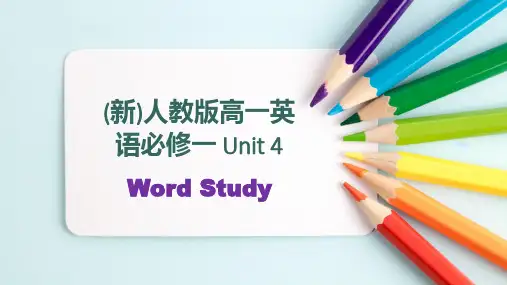

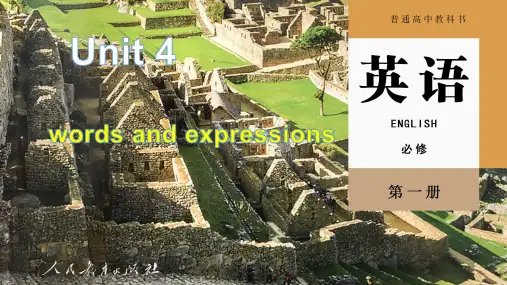
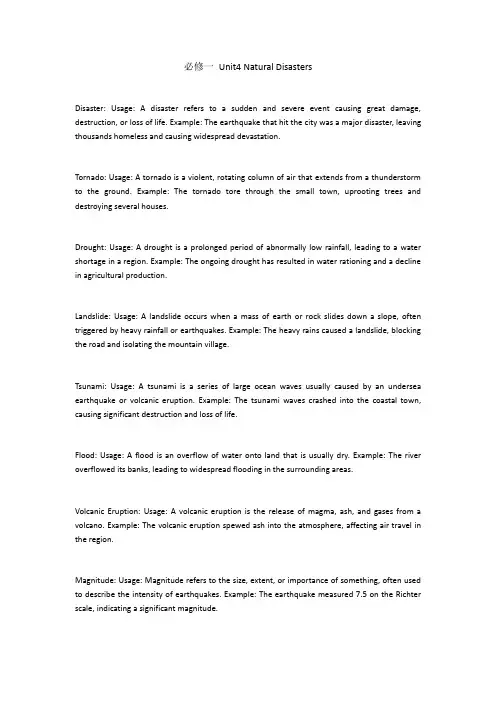
必修一Unit4 Natural DisastersDisaster: Usage: A disaster refers to a sudden and severe event causing great damage, destruction, or loss of life. Example: The earthquake that hit the city was a major disaster, leaving thousands homeless and causing widespread devastation.Tornado: Usage: A tornado is a violent, rotating column of air that extends from a thunderstorm to the ground. Example: The tornado tore through the small town, uprooting trees and destroying several houses.Drought: Usage: A drought is a prolonged period of abnormally low rainfall, leading to a water shortage in a region. Example: The ongoing drought has resulted in water rationing and a decline in agricultural production.Landslide: Usage: A landslide occurs when a mass of earth or rock slides down a slope, often triggered by heavy rainfall or earthquakes. Example: The heavy rains caused a landslide, blocking the road and isolating the mountain village.Tsunami: Usage: A tsunami is a series of large ocean waves usually caused by an undersea earthquake or volcanic eruption. Example: The tsunami waves crashed into the coastal town, causing significant destruction and loss of life.Flood: Usage: A flood is an overflow of water onto land that is usually dry. Example: The river overflowed its banks, leading to widespread flooding in the surrounding areas.Volcanic Eruption: Usage: A volcanic eruption is the release of magma, ash, and gases from a volcano. Example: The volcanic eruption spewed ash into the atmosphere, affecting air travel in the region.Magnitude: Usage: Magnitude refers to the size, extent, or importance of something, often used to describe the intensity of earthquakes. Example: The earthquake measured 7.5 on the Richter scale, indicating a significant magnitude.Rescue: Usage: Rescue involves saving someone from a dangerous or distressing situation. Example: The search and rescue team worked tirelessly to find survivors trapped under the collapsed building.Damage: Usage: Damage refers to harm or injury caused by an event or action. Example: The storm caused extensive damage to the infrastructure, leaving many without electricity.Destroy: Usage: Destroy means to completely ruin or damage something beyond repair. Example: The fire destroyed the historic building, reducing it to ashes.Evacuate: Usage: Evacuate means to move people away from a dangerous area to a safer place. Example: The authorities ordered residents to evacuate as the floodwaters continued to rise.Helicopter: Usage: A helicopter is a type of aircraft that can take off and land vertically and is often used for transportation or rescue operations. Example: The injured hiker was airlifted to safety by a helicopter.Death: Usage: Death refers to the end of life or the state of being deceased. Example: The earthquake resulted in several deaths and many injuries.Affect: Usage: Affect means to produce a change or influence something. Example: The economic crisis affected businesses and led to job losses.Shelter: Usage: Shelter is a place that provides protection and safety, especially during emergencies or disasters. Example: The relief organization set up temporary shelters for the displaced families.Crack: Usage: A crack is a narrow opening or fracture, often found in surfaces like walls or rocks. Example: The earthquake caused cracks to appear in the walls of many buildings.Gas: Usage: Gas refers to a substance in a state that is neither solid nor liquid, such as oxygen or carbon dioxide. Example: The leak of a toxic gas from the factory caused several people to fall sick.As if: Usage: "As if" is a phrase used to compare something or express a resemblance. Example: The wind howled outside as if a storm was approaching.Ruin: Usage: Ruin refers to the state of being destroyed or severely damaged. Example: The abandoned castle was in a state of ruin, with only its walls standing.In ruins: Usage: "In ruins" means something has been completely destroyed or fallen into a state of decay. Example: After the earthquake, the once-thriving city lay in ruins.Percent: Usage: Percent is a unit of measurement representing a portion out of 100. Example: Fifty percent of the population voted in favor of the new law.Brick: Usage: A brick is a rectangular block made of clay or other materials, used for building walls or structures. Example: The old house was constructed using red bricks.Metal: Usage: Metal refers to a solid material that is typically hard, shiny, and has good electrical conductivity. Example: The roof of the building was made of corrugated metal sheets.Shock: Usage: Shock is a strong emotional or physical reaction to a sudden, unexpected event. Example: The news of the accident left everyone in shock.In shock: Usage: "In shock" means being in a state of extreme surprise, disbelief, or emotional numbness. Example: She was in shock after hearing about her friend's sudden death.Electricity: Usage: Electricity is a form of energy produced by the movement of electrons, commonly used for powering devices and lighting. Example: The power outage left the entire neighborhood without electricity.Trap: Usage: To trap means to catch or confine something or someone in a confined space. Example: The hikers were trapped in the cave due to a rockfall.Bury: Usage: To bury means to put something or someone in the ground and cover it with soil. Example: The archaeologists uncovered ancient artifacts buried deep in the earth.Breathe: Usage: To breathe means to inhale and exhale air, necessary for sustaining life. Example: The fresh mountain air made it easier to breathe.Revive: Usage: To revive means to bring back to life or consciousness. Example: The lifeguard performed CPR to revive the drowning swimmer.Revival: Usage: Revival refers to the act of bringing something back to life or popularity. Example: The classic play received a revival on Broadway, attracting a new audience.Effort: Usage: Effort is the exertion of physical or mental energy to accomplish something. Example: With great effort, they managed to complete the challenging task.Unify: Usage: To unify means to bring together or combine to form a single unit or entity. Example: The treaty aimed to unify the two neighboring countries.Wisdom: Usage: Wisdom refers to the ability to apply knowledge and experience to make sound judgments and decisions. Example: The elder shared her wisdom with the younger members of the community.Context: Usage: Context is the circumstances or information that surround a particular event or situation and give it meaning. Example: Without proper context, the statement can be easily misunderstood.Suffer: Usage: To suffer means to experience pain, distress, or hardship. Example: The victims of the natural disaster suffered immense losses.Volcano:Usage:A volcano is a geological formation that results from the eruption of molten rock (magma) onto the Earth's surface. It can also refer to the vent or opening through which this magma, volcanic ash, and gases are expelled. Example: Volcanoes can have a significant impact on the environment and surrounding communities.Erupt: Usage: Erupt" is a verb that means to burst forth or release suddenly, often with great force or violence. It is commonly used to describe volcanic activity when a volcano releases magma, ash, and gases onto the Earth's surface. Example : The volcano erupted, sending a plume of ash and smoke high into the sky.Supply: Usage: Supply refers to the quantity of something available for use or distribution. Example: The stores quickly ran out of supplies during the hurricane preparation.Typhoon: Usage: A typhoon is a tropical cyclone that occurs in the Pacific region. Example: The typhoon caused widespread destruction and flooding in the coastal areas.Hurricane: Usage: A hurricane is a powerful tropical cyclone that forms in the Atlantic or eastern Pacific Ocean. Example: The hurricane's strong winds uprooted trees and damaged buildings.Survive: Usage: To survive means to continue to live or exist despite difficult circumstances. Example: With proper medical care, the patient managed to survive the life-threatening illness.Power: Usage: Power refers to the ability to control or influence others or the environment. Example: The strong winds knocked down power lines, causing a blackout.Tap: Usage: To tap means to lightly touch or strike something. Example: She tapped on the window to get her friend's attention.Pipe: Usage: A pipe is a long, tube-like structure used to convey liquids or gases. Example: The burst pipe flooded the basement of the house.Whistle: Usage: To whistle means to make a high-pitched sound by blowing air through pursed lips. Example: The coach used a whistle to signal the start of the game.Emergency: Usage: An emergency is a situation that requires immediate action to prevent harm or damage. Example: The hospital was well-prepared to handle the influx of patients during theemergency.Calm: Usage: Calm refers to a state of tranquility or lack of agitation. Example: After the storm passed, the sea returned to a calm state.Aid: Usage:Aid is a noun that refers to assistance, support, or help provided to someone in need, especially during difficult or challenging circumstances. It can also be used as a verb, "to aid," which means to provide assistance or support. Example: The humanitarian organization provided food, medical aid, and shelter to the victims of the natural disaster.Kit: Usage: Kit" is a noun that refers to a set of tools, equipment, or items assembled together for a specific purpose or activity. It is often used to describe a collection of items that are needed or useful for a particular task or situation. Example: The first-aid kit in the office contained bandages, antiseptic wipes, and pain relievers.On hand: Usage: On hand is a phrase that means having something readily available or easily accessible at the current moment. It implies that the item or resource is within reach and can be used or accessed without delay. Example: The firefighters always keep first-aid supplies on hand in case of emergencies.Crash: Usage: A crash refers to a violent collision or impact. Example: The two cars collided, resulting in a severe crash.Sweep: Usage: To sweep means to clean or move away debris or dirt with a broom or a similar tool. Example: He swept the fallen leaves off the driveway.Sweep away: Usage: To sweep away means to remove or carry away something quickly and forcefully. Example: The floodwaters swept away everything in their path.Wave: Usage: A wave is a moving ridge or swell on the surface of water. Example: The surfer rode the wave all the way to the shore.Strike: Usage: To strike means to hit or deliver a blow. Example: The lightning strike hit the tree, causing it to catch fire.Deliver: Usage: To deliver means to transport or bring something to a specific location. Example: The courier will deliver the package to your doorstep.Summary: Usage: A summary is a concise and condensed version of information or a story. Example: The professor provided a summary of the key points at the end of the lecture.Effect: Usage: Effect refers to the result or consequence of a particular action or event. Example: The new policy had a positive effect on the company's profits.Length: Usage: Length refers to the measurement of something from one end to the other. Example: The length of the river is approximately 500 kilometers.。

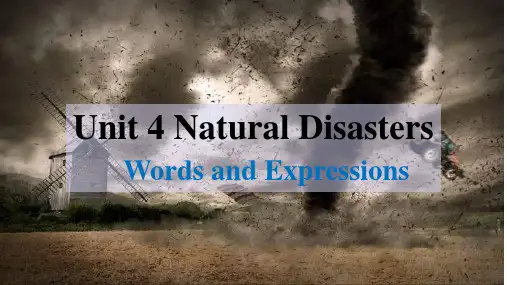
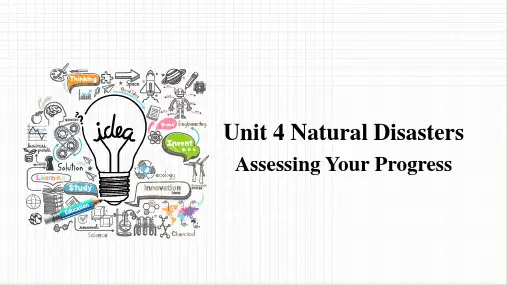
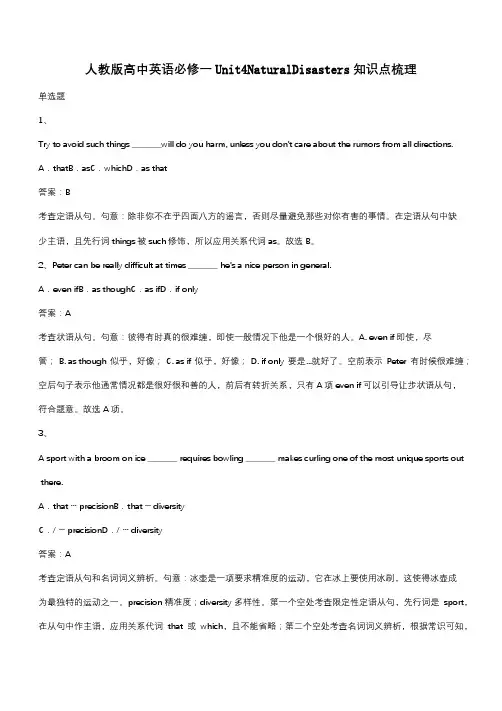
人教版高中英语必修一Unit4NaturalDisasters知识点梳理单选题1、Try to avoid such things ________will do you harm, unless you don't care about the rumors from all directions. A.thatB.asC.whichD.as that答案:B考查定语从句。
句意:除非你不在乎四面八方的谣言,否则尽量避免那些对你有害的事情。
在定语从句中缺少主语,且先行词things被such修饰,所以应用关系代词as。
故选B。
2、Peter can be really difficult at times ________ he’s a nice person in general.A.even ifB.as thoughC.as ifD.if only答案:A考查状语从句。
句意:彼得有时真的很难缠,即使一般情况下他是一个很好的人。
A. even if即使,尽管; B. as though似乎,好像; C. as if似乎,好像; D. if only要是...就好了。
空前表示Peter有时候很难缠;空后句子表示他通常情况都是很好很和善的人,前后有转折关系,只有A项even if可以引导让步状语从句,符合题意。
故选A项。
3、A sport with a broom on ice ________ requires bowling ________ makes curling one of the most unique sports out there.A.that … precisionB.that … diversityC./ … precisionD./ … diversity答案:A考查定语从句和名词词义辨析。
句意:冰壶是一项要求精准度的运动,它在冰上要使用冰刷,这使得冰壶成为最独特的运动之一。
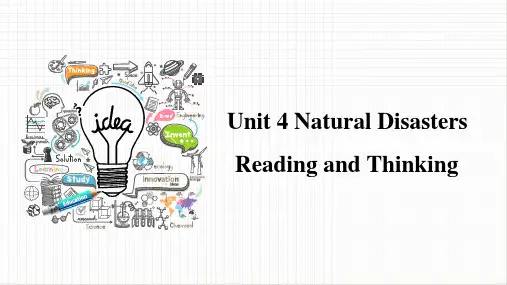
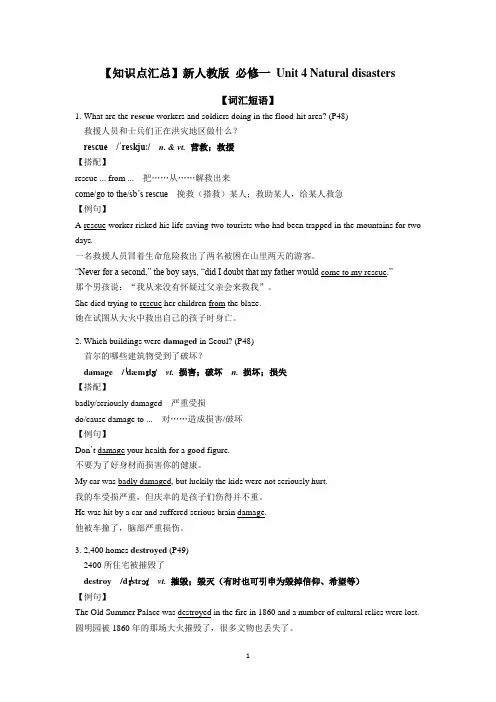
【知识点汇总】新人教版必修一Unit 4 Natural disasters【词汇短语】1. What are the rescue workers and soldiers doing in the flood-hit area? (P48)救援人员和士兵们正在洪灾地区做什么?rescue /ˈreskjuː/ n. & vt.营救;救援【搭配】rescue ... from ... 把……从……解救出来come/go to the/sb’s rescue 挽救(搭救)某人;救助某人,给某人救急【例句】A rescue worker risked his life saving two tourists who had been trapped in the mountains for two days.一名救援人员冒着生命危险救出了两名被困在山里两天的游客。
“Never for a second,” the boy says, “did I doubt that my father would come to my rescue.”那个男孩说:“我从来没有怀疑过父亲会来救我”。
She died trying to rescue her children from the blaze.她在试图从大火中救出自己的孩子时身亡。
2. Which buildings were damaged in Seoul? (P48)首尔的哪些建筑物受到了破坏?damage /ˈdæmɪdʒ/ vt.损害;破坏n.损坏;损失【搭配】badly/seriously damaged 严重受损do/cause damage to ... 对……造成损害/破坏【例句】Don’t damage your health for a good figure.不要为了好身材而损害你的健康。
My car was badly damaged, but luckily the kids were not seriously hurt.我的车受损严重,但庆幸的是孩子们伤得并不重。
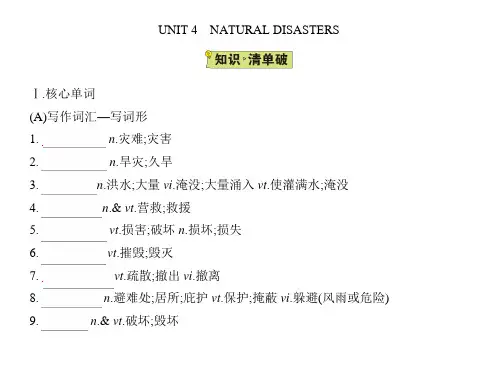
人教版高中英语必修一Unit4NaturalDisasters重点归纳笔记单选题1、When people talk about the cities of the U.S., the first________comes into mind is New York. A.oneB.thatC.whichD.of them答案:B考查定语从句。
句意:当人们谈论美国的城市时,首先想到的是纽约。
A.one 一个;B.that 那个;C. which 那个;D. of them 他们的。
分析句子结构可知,这是一个定语从句,先行词是the first是序数词,应该用关系代词that引导从句,且that在从句中作主语。
故选B项。
2、I think this is the most interesting story_________is made up by my uncle.A.whatB.whichC.thatD.as答案:C考查定语从句。
句意:我认为这是我叔叔编的最有趣的故事了。
_________could be used to buy clothes for his children.是一个定语从句,由于先行词story在定语从句中作主语,且被形容词的最高级修饰,因此关系代词只能用that,故选C。
3、I’ll ask the teacher about the subjunctive mood______I’m very puzzled about; and that’s also ______ most of our clas smates have doubt.A.which; whatB.why; thatC.which; whereD.that; how答案:C考查定语从句和表语从句。
句意:我会问老师关于虚拟语气的问题,我对此很困惑;这也是我们大多数同学怀疑的地方。
“I’m very puzzled about”是定语从句,从句中缺少宾语,先行词“the subjunctive mood”是物,因此第一空用关系代词which/that引导定语从句,“most of our classmates have doubt”是表语从句,从句中不缺主语或宾语,根据语境可知,句子表示“这也是我们大多数同学怀疑的地方”,因此空格处是“......的地方”,因此第二空用where引导表语从句,故选C。
人教版(2023)必修第一册UNIT 4 NATURAL DISASTERS基础词汇讲解练习(含答案)必修第一册UNIT 4 NATURAL DISASTERS (人教版2023)学生版主题语境:人与自然——自然灾害第一部分集中熟记Ⅰ. 课文词汇disaster /d zɑ st (r)/ n. 灾难;灾害tornado /t ne d / n. (pl. -oes or -os) 龙卷风;旋风drought /dra t/ n. 旱灾;久旱landslide / l ndsla d/ n. (landfall) (山地或悬崖的)崩塌;滑坡slide /sla d/ vi. & vt. (使)滑行;滑动tsunami /tsu nɑ mi/ n. 海啸flood /fl d/ n. 洪水;大量vi 淹没;大量涌入vt. 使灌满水;淹没volcanic eruption /v l k n k 'r p n/ 火山喷发magnitude / m gn tju d/ n. (地)震级;重大rescue / reskju / n. & vt. 营救;救援damage / d m d / vt. 损害;破坏n. 损坏;损失destroy /d str / vt. 摧毁;毁灭evacuate / v kjue t/ vt. 疏散;撤出vi. 撤离helicopter / hel k pt (r)/ n. 直升机death /deθ/ n. 死;死亡affect / fekt/ vt. 影响;(疾病)侵袭;深深打动shelter / elt (r)/ n. 避难处;居所;庇护vt. 保护;掩蔽vi. 躲避(风雨或危险)crack /kr k/ n. 裂纹;裂缝vi. & vt. 使破裂as if / z f/ 似乎;好像;仿佛ruin / ru n/ n. & vt. 破坏;毁坏in ruins / n 'ru nz/ 严重受损;破败不堪percent /p 'sent/ n. 百分之... adj. & adv. 每一百中brick /br k/ n. 砖;砖块metal / metl/ n. 金属shock / k/ n. 震惊;令人震惊的事;休克vt. (使)震惊;in shock / n k/ 震惊;吃惊electricity / lek tr s ti/ n. 电;电能trap /tr p/ vt. 使落入险境;使陷入圈套n. 险境;陷阱bury / beri/ vt. 埋葬;安葬breathe /bri / vi. & vt. 呼吸revive /r va v/ vi. & vt. 复活;(使)苏醒revival /r va vl/ n. 振兴;复苏effort / ef t/ n. 努力;艰难的尝试;尽力unify / ju n fa / vi. & vt. 统一;(使)成一体wisdom / w zd m/ n. 智慧;才智context / k ntekst/ n. 上下文;语境;背景suffer /s f / vt. 遭受;蒙受vi. (因疾病、痛苦、悲伤等)受苦volcano /v l ke n / n. (pl . -oes or -os) 火山erupt / r pt/ vi. & vt. (火山)爆发;(岩浆、烟等)喷出supply /s pla / n. 供应(量);补给;[pl. ] 补给品vt. 供应;供给typhoon /ta fu n/ n. 台风in the open air / n p n e (r)/ 露天;在户外hurricane / h r k n/ n. (尤指西大西洋的)飓风survive /s va v/ vi. 生存;存活vt. 幸存;艰难度过power / pa (r)/ n. 电力供应;能量;力量;控制力tap /t p/ vi. & vt. 轻叩;轻敲;轻拍n. 水龙头;轻叩;轻敲pipe /pa p/ n. 管子;管道whistle / w sl/ vi. 吹口哨;发出笛声vt. 吹口哨n. 哨子(声);呼啸声emergency /i m d nsi/ n. 突发事件;紧急情况calm /kɑ m/ adj. 镇静的;沉着的vt. 使平静aid /e d/ n. 援助;帮助;救援物资vi. & vt. (formal) 帮助;援助kit /k t/ n. 成套工具;成套设备first aid kit /f st e d k t/ 急救箱on hand / n h nd/ 现有(尤指帮助)crash /kr / vt. & vi. 碰撞;撞击n. 撞车;碰撞sweep /swi p/ vt. & vi. (swept, swept) 打扫;清扫sweep away /swi p we / 消灭;彻底消除wave /we v/ n. 海浪;波浪vi. & vt. 挥手;招手strike /stra k/ vi. & vt. ( struck, struck/stricken ) 侵袭;突击;击打n. 罢工;罢课;袭击deliver /d l v (r)/ vi. & vt. 传递;传达vt. 发表summary / s m ri/ n. 总结;概括;概要effect / fekt/ n. 影响;结果;效果length /le θ/ n. 长;长度Ecuador /'ekw d (r)/ 厄瓜多尔(国家名)Memphis / memfis/ 孟菲斯(米国城市)Alberta / l'b t / 艾伯塔省(加拿大省份)Colombo /k l mb u/ 科伦坡(斯里兰卡首都)Sri Lanka /sri lɑ k / 斯里兰卡(国家名)Indonesia / nd 'ni zj / 印度尼西亚(国家名)Thailand /'ta l nd/ 泰国(国家名)Malaysia /m 'le / 马来西亚(国家名)Sumatra Island /s mɑ tr a l nd/ 苏门答腊岛Chandra Theeravit 钱德拉·特拉维Ⅰ. 核心词汇分类记忆阅读词汇学其意disaster n. ______________________drought n. ______________________slide vi. & vt. ______________________shelter n. ____________________ vt. ____________________vi. ___________________context n. ______________________volcano n. ______________________erupt vi. & vt. ______________________typhoon n. ______________________hurricane n. ______________________tap vi. & vt. ______________________n. ______________________ whistle vi. ______________________vt. ________________n. ______________________emergency n. ____________高频词汇知其形_____________ n. & vt. 营救;救援_____________ vt. 损害;破坏n. 损坏;损失_____________ vt. 摧毁;毁灭_____________ vt. 影响;(疾病)侵袭;深深打动_____________ n. 电;电能_____________ vt. 埋葬;安葬_____________ n. 努力;艰难的尝试;尽力_____________ n. 智慧;才智_____________ n. [ pl. ] 补给品;供应(量);补给vt. 供应;供给_____________ adj. 镇静的;沉着的vt. 使平静;使镇静_____________ vt. & vi. 打扫;清扫_____________ vi. & vt. 侵袭;突击;击打n. 罢工;罢课;袭击_____________ vt. & vi. 递送;传达vt. 发表_____________ n. 总结;概括;概要_____________ n. 影响;结果;效果拓展词汇通变化survive vi. 生存存活vt. 幸存;艰难度过→_____________ n. 幸存者;生还者→_____________ n. 幸存death n. 死;死亡→_____________ adj. 无生命的shock n. 震惊;令人震惊的事;休克vt. (使)震惊→_____________ adj. 令人震惊的→_____________ adj. 感到震惊的breathe vi. & vt. 呼吸→_____________ n. 呼吸;(空气的)微微流动→_____________ adj. 气喘吁吁的;屏息的revive vt. & vi. 复活;(使)苏醒→_____________ n. 振兴;复苏unify vi. & vt. 统一;(使)成一体→_____________ vi. & vt. 团结suffer vt. 遭受;蒙受vi. (因疾病、痛苦、悲伤等)受苦→_____________ n. 折磨;苦难erupt vi. & vt. (火山)爆发;(岩浆、烟等)喷出;突然发生→_____________ n. 火山爆发;(战争等)爆发power n. 力供应;能量;力量;控制力→_____________ adj. 强大的;有力的→_____________ adj. 无力的;没有能力的effect n. 影响;结果;效果→_____________ adj. 有效果的length n. 长;长度→_____________ adj. 长的4. 高频词块明搭配______________________ 似乎;好像;仿佛______________________ 严重受损;破败不堪______________________ 震惊;吃惊______________________ 露天;在户外______________________ 急救箱______________________ 消灭;彻底消除______________________ 现有(尤指帮助)______________________建立______________________ 火山喷发5. 词汇风暴连连看1)头脑风暴一A. “惊讶”高频词① astonishing A. adj. 令人吃惊的② astonished B. adj. 令人惊讶的③ amazing C. adj. 令人震惊的④ amazed D. adj. 吃惊的⑤ shocking E. adj. 惊讶的⑥ shocked F. adj. 感到震惊的B. 同根短语--“in+名词”短语面面观① in trouble A. 井然有序② in danger B. 处于危险中③in return C. 在困境中④in shock D. 在适当的位置⑤in order E. 作为回报⑥in place F. 震惊;吃惊2)后缀th高频名词荟萃①length A. 力量②strength B. 长度③warmth C. 财富④width D. 宽度⑤depth E. 深度⑥wealth F. 温暖3)头脑风暴三——与课文话题关联词汇A. 自然灾害① flood A. n. 火山② hurricane B. n. 台风③ sandstorm C. n. 沙尘暴④ typhoon D. n. 洪水⑤ volcano E. n. 飓风⑥ snowstorm A. n. 山体滑坡⑦ tornado B. n. 龙卷风⑧ tsunami C. n. 旱灾;干旱⑨ landslide D. n. 海啸⑩ drought E. n. 暴风雪B. 自然灾害的危害① terrify A. adj. 放射性的② ash B. n. & vi. 惊慌;恐慌③ victim C. n. 灰;灰末④ catastrophe D. n. 灾难;灾祸⑤ radioactive E. n. 受害者⑥ panic F. vt. 使恐惧;使惊吓⑦ muddy A. adj. 狂暴的;恶劣的⑧ lava B. adj. 泥泞的⑨ melt C. adj. 潮汐的;有涨落的⑩ tidal D. n. 熔岩;岩浆worsen E. vi. (使)恶化fierce F. vi. 融化Ⅰ. 经典句型牢记心1. 句型公式:too+形容词+to ... 太……而不能……[教材原句p.50] Chickens and even pigs ______________________ (太紧张而吃不下东西), and dogs refused to go inside buildings.2. 句型公式:as if ... 似乎/好像/仿佛……[教材原句p.50] ____________________________________________ (仿佛世界默日即将来临)!3. 句型公式:be doing sth. when ... 正在做某事,那时……[教材原句p.54] I ___________________________________________ (正在和我的三个孩子吃早餐,那时) water started filling my home.第二部分集中练通Ⅰ. 阅读词汇认知1. This is one of the worst natural disasters ever to hit the area. _________________2. In order to catch the bear, some villagers set a trap and covered it with some leaves. _________________3. The people in the earthquake-stricken area are in need of food, medicine and shelters. _________________4. More than 70 people were killed in the floods, caused when a dam burst. _________________5. An emergency is an unexpected and difficult or dangerous situation, especially an accident, that happens suddenly and that requires quick action to deal with it. _________________Ⅰ. 写作词汇填空1. The earthquake was so big that most of the houses in the small village were completely _____________ (摧毁).2. After learning that the boys had been lost for almost 20 hours, the police sent out a _____________ (救援) team to look for them.3. An unhappy home environment can _____________ (影响) a child’sbehaviour.4. In spite of great _____________ (努力), we failed to carry out our plans through.5. He still kept _____________ (冷静的) in the face of danger.6. The Canadians plan to _____________ (运送) more food to southern Somalia.Ⅰ. 拓展词汇变形1. Mastering some basic skills would greatly increase your chances of _____________ (survive).2. Thanks to the swimming skills, Tom and his friend succeeded in _____________ the terrible flood and they were the only two _____________. (survive)2. The _____________ disease has affected many people and has caused at least 30 _____________ up to now. (dead)3. We were _____________ at the _____________ news that he died suddenly yesterday. (shock)4. It would be _____________ (wise) to comment on the situation without knowing all the facts.5. In order to find more _____________ (effect) ways to protect the environment and help all of us avoid waste, we called on the government to put the law into effect.Ⅰ. 词块搭配选用sweep away, the number of, wave goodbye to, be delivered of, fall down, dig out, be trapped in, in ruins1. We haven’t cleaned the house for a few days, because we don’t want to _________________ good luck.2. Judging from _________________ cars, he thought there were not many people in the club.3. After hours of suffering she _________________ a healthy baby.4. They _________________ the burning building. Please call 119 right away.5. It was reported that an American couple had _________________ a lot of gold coins from their own yard.6. Remember that success is getting up just one more time than you _________________.Ⅰ. 句型仿写1. 坐在船里的一对年轻夫妇一边吃东西一边大声地谈笑,好像他们是世上唯一的人。